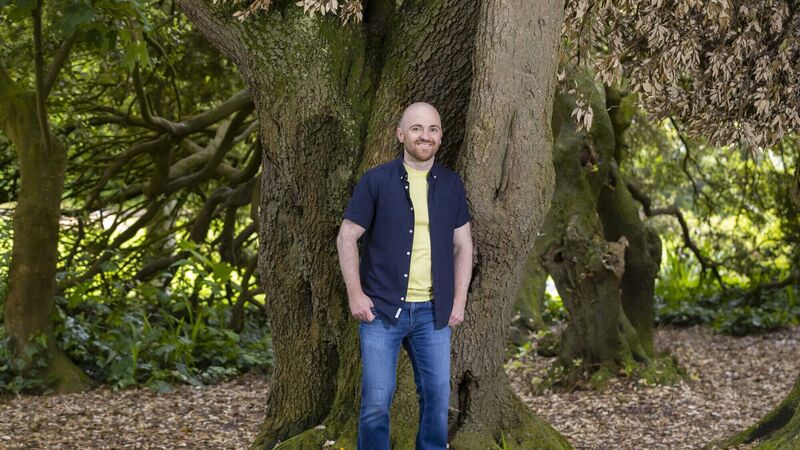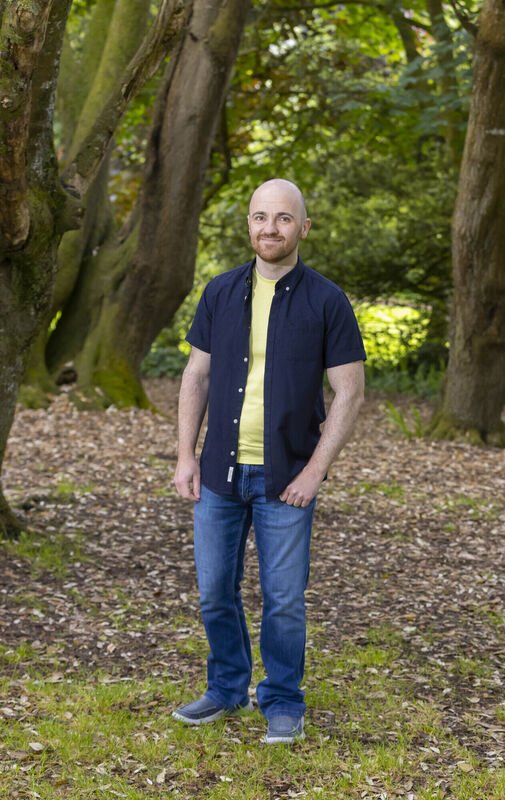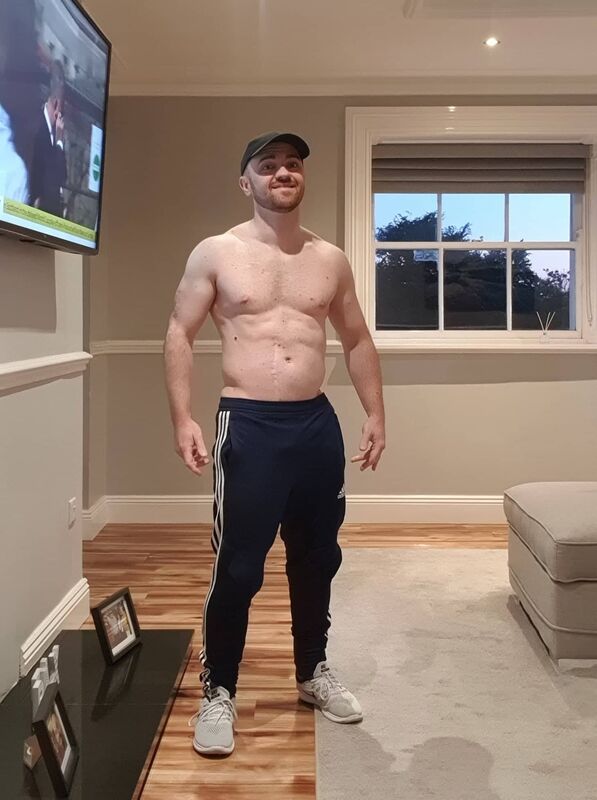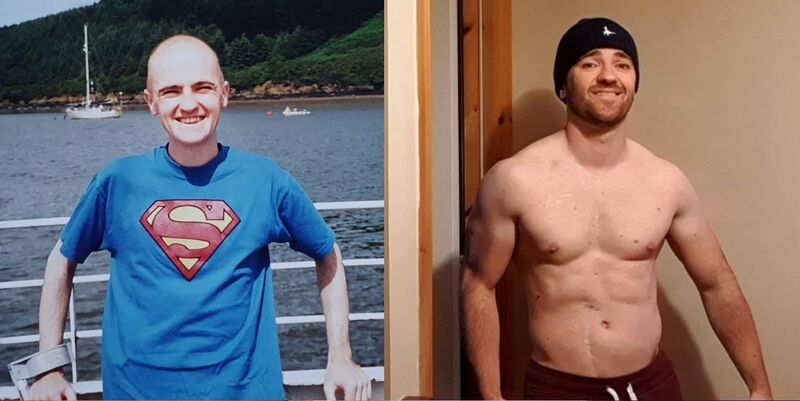39-year-old university lecturer has had cancer three times but 'keeps fighting'

04/06/2022. XX Irene Feighan. Pictured is Brian Tobin, Waterford City. Picture: Patrick Browne
I was diagnosed with my first rare cancer, a bone tumour deep in my pelvis in 2002. The tumour was a considerable size, so the oncologist informed me that the main objective was to save my life, and subsequently my affected left leg, if possible.
At the time, I was an ambitious, teenage law student at Trinity College Dublin who had never spent a single night in a hospital bed, yet suddenly I was faced with months of inpatient chemotherapy and its many undesirable side effects. Thankfully, the tumour responded well to chemotherapy treatment, but to fully eradicate it would involve surgery. Due to the complex location of the tumour in my left hemipelvis, surgeons gave me the option of a hindquarter amputation, a procedure so severe that there would be no possibility of later fitting an artificial limb — life as a wheelchair user or the need for permanent walking aids to support walking with my remaining right leg awaited me.
However, while I was undergoing chemotherapy, my medical team at St James’s in Dublin learned of the Royal National Orthopaedic Hospital (RNOH) in London, where surgeons could not only remove bone tumours deep in the pelvis but also salvage the affected limb. Following my chemotherapy treatment, I underwent the limb-salvage surgery in London without haste.

While successful, the surgery was hugely invasive, and it took me several years to regain strength and learn to walk unaided again. However, I ultimately had two functioning legs thanks to the insertion of a ‘mega-prosthesis’ in place of my left hemipelvis and femur. These days, I have merely a slight limp, but I work full-time, exercise regularly (albeit must go easy on the weights on ‘leg day’), and even dance — badly. Contact sports are off the table, but anyone who has ever seen me attempt to play team sports prior to the operation will know I'm no loss whatsoever.
By 2007 I had reached the much-coveted five-year remission period, and I barely gave cancer a second thought after that. I was busy learning to walk again, alongside completing three law degrees (bachelor's, master's, and doctorate). I had been offered a traineeship at a leading corporate law firm in Dublin but, realising I was quite the nerd, I turned it down to pursue a PhD, and I ultimately commenced work as a full-time academic at NUI Galway.
In 2014 I developed sepsis during a trip to speak at a conference in Italy and was lucky to make it back home and to University Hospital Galway. While being treated, doctors noticed a large mole on my right ankle. It was melanoma. Cancer had suddenly come back into my life, but luckily only surgical treatment was required. The mole was quickly excised by plastic surgeons at UHG, and a large skin graft from my left thigh was used to repair the damage to my ankle.
In 2018, I was at King’s College London, merely weeks into my first year-long sabbatical from NUI Galway, when I noticed a pea-sized lump had developed on my upper right arm. The RNOH in London had been monitoring me since 2002, so I contacted the surgical team, who quickly arranged a biopsy. The result revealed a malignant soft-tissue tumour. By this time, the pea-sized lump was the size of a golf ball and growing.
I had to undergo six weeks of radiotherapy, and surgery. The tumour was pressing on the radial nerve, which controls function in the right hand, and the surgeons informed me there was a significant risk that removing it would damage the nerve and cause a total loss of function in my right hand. The tumour was fully and skilfully removed and once again the same specialist tumour hospital which left me with a functioning left leg in 2002 also left me with a functioning right hand in 2019. To say I was ecstatic would be an understatement.
However, as this was my third different, rare cancer, and I was only in my 30s, the surgeons recommended I undergo genetic testing. The test result revealed Li-Fraumeni syndrome, which means I have a defective TP53 gene and a genetic predisposition to rare cancers. Li-Fraumeni syndrome is incredibly rare, usually inherited, and estimated to affect five in every 20,000 families worldwide. My Li Fraumeni was not inherited. I am the first in my family with the condition, which is an occurrence so rare that there are no statistics.
Nonetheless, after almost 18 years, three cancers and many surgeries later, I finally had an answer. Despite that answer representing what to many might seem like a devastating diagnosis, I drew tremendous solace from it. Rather than resigning myself to the fact that I simply had horrible luck impacting some of the best decades of my life, I now knew there was a genetic reason for what had been happening to me since 2002.
International best practice indicates that people with Li Fraumeni should receive a full-body MRI scan every 12 months for early detection, and I have been enrolled in such a screening programme at St James’s in Dublin. Having had cancer in my left hemipelvis, upper right arm and right ankle, I know that there’s the possibility another pea-sized lump, atypical mole or unusual pain could arise at any time.
Indeed, a low-grade tumour was detected in my brain in 2020, but has remained stable ever since and may not become an issue for decades. Nonetheless, I am not preoccupied with my situation or potential future diagnoses. Despite the passing of 20 years, I’m as ambitious now as when I first contracted cancer. I’ve established a reputation as an academic in child and family law, am the deputy head of the School of Law at NUI Galway, and am about to publish my first academic book later this year.

However, I have to acknowledge that I have had the benefit of early and correct diagnoses, In Ireland and Britain, and have received tremendous care in Dublin, London, Galway and, whenever I have fallen ill while at home in ‘the Déise’ (I’m somewhat immunocompromised from the various treatments) from my family GP, and staff at University Hospital Waterford. I take comfort in my parents, brothers, extended family, supportive colleagues at NUI Galway, and my friends, particularly those who supported me after my various diagnoses.

Whenever possible, I assist and encourage my students in realising their goals and potential, because I see in them my younger self, juggling tremendous personal circumstances and my studies at what should have been a carefree age, and I know that support can be transformative. The years spanning 2002 and 2022 have been a remarkable journey — here’s to the next 20, and beyond. For me, hope springs eternal.
See: cancer.ie







